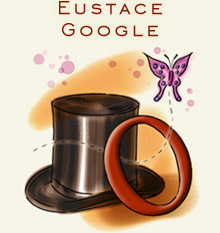Emdashes—Modern Times Between the Lines
The Basics:
About Emdashes | Email us
Ask the Librarians
Best of Emdashes: Hit Parade
A Web Comic: The Wavy Rule
Features & Columns:
Headline Shooter
On the Spot
Looked Into
Sempé Fi: Cover Art


From the smart cookies at Beatrice, an essay by guest author Meg Wolitzer about chick-lit novels, which she (winningly) calls Pink Ladies:
The Pink Ladies are completely apolitical. Yet beneath their manicured, high-gloss surfaces is a depiction of a certain kind of urban female life at this point in time. If these books were placed in a time capsule and opened up at a much later date, people would get to see what these post-post-post-feminist women were like. They'd see how sexual freedom played a big part in their lives, as big a part as, say, finding the right handbag or the right man to marry. Marriage certainly has a big role in these books, but it isn't contradictory to autonomy. In fact, autonomy here is about choosing the right man, and not settling for the dullish Lord or Viscount or advertising executive waiting in the wings. It's not groundbreaking or powerful, but it speaks to many women, even, weirdly, a woman like me, a long-married feminist and novelist. Chick lit is a damning term, one that brings to mind tight skirts and empty heads. But there's an irony and self-awareness at work in some of these books, hiding inside a blaze of pink.
Sure, why not? I never liked the term "chick lit" and its segregation from the rest of popular fiction. Like Wolitzer, I like Marian Keyes and the original Bridget Jones, as well as other novels that get promoted into the bad-pastel-cover ghetto. Even Cathleen Schine—who, despite the oprahtic film made from The Love Letter, can't be accused of tailoring her stuff to the mass market—got chicklitized with She Is Me, whose lowercase letters and coy design got her placed on that loathsomely perky B&N rack near the front of the store, but undoubtedly kept serious readers away from discovering the book.
Wolitzer herself has done a comfortably swerving walk along the line between mainstream and hard-to-place; her early novels Sleepwalking and This Is My Life are about women and girls, and they're dark as hell. Though I like the 1992 movie Nora Ephron made of the latter (starring Julie Kavner, and see it before you roll your eyes), it's more of the same—all the really hard stuff is gone, leaving mostly laughs and flapjacks, with the exception of the best virginity-losing scene on film I know.
There's plenty of light (more likely, deceptively light) reading out there that doesn't get smooshed into a category, and besides, I'm sure there are dozens of absolute treasures buried in the African-American popular fiction section, say, or the gay-fiction shelf. Have you read Joe Keenan (who also wrote a lot of Frasier) or Stephen McCauley? If not, you're really missing out. I hate to think who else is hiding behind some idiot superstore's idea of a genre. Come out, come out, wherever you are, and let the Pink Ladies and the T-Birds—and all combinations therein—get it on.
In Praise of Pink Ladies [Beatrice]
Why Grease? [Zulkey]
Categories: Books, Movies



